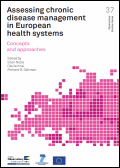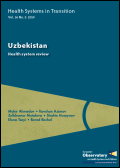 SELECTED FOR YOU... MARCH 2015
SELECTED FOR YOU... MARCH 2015
 books of the month
books of the month
 watch on health economics
watch on health economics
All the Selected for you
BOOKS
Assessing chronic disease management in European health systems: concepts and approaches.
Organisation Mondiale de la Santé. (O.M.S.). Genève. CHE,European Observatory on Health Systems and Policies. Brussels. BEL,Observatoire Européen des Systèmes et Politiques de Santé. Bruxelles. BEL
Copenhague : OMS Bureau régional de l'Europe, 2014
The rising burden of chronic illness, in particular the rapid increase in the number of people with multiple health problems, is a challenge to health systems globally. Associated premature mortality and reduced physical functioning, along with higher use of health services and related costs, are among the key concerns faced by policymakers and practitioners. There is a clear need to redesign delivery systems in order to better meet the needs created by chronic conditions, moving from the traditional, acute and episodic model of care to one that better coordinates professionals and institutions and actively engages service users and their carers. Many countries have begun this process but it has been difficult to reach conclusions about the best approach to take: care models are highly context-dependent and scientifically rigorous evaluations have been lacking. Assessing chronic disease management in European health systems explores some of the key issues, ranging from interpreting the evidence base to assessing the policy context for, and approaches to, chronic disease management across Europe. Drawing on 12 detailed country reports (available in a second, online volume), the study provides insights into the range of care models and the people involved in delivering these; payment mechanisms and service user access; and challenges faced by countries in the implementation and evaluation of these novel approaches. This book builds on the findings of the DISMEVAL project (Developing and validating DISease Management EVALuation methods for European health care systems), led by RAND Europe and funded under the European Union's (EU) Seventh Framework Programme (FP7) (Agreement no. 223277).
Health system review : Uzbekistan.
Ahmedov A., Azimov R., Mutalova Z. et al.
Copenhague : OMS Bureau régional de l'Europe, 2014
Since the country's independence in 1991, Uzbekistan has embarked on several major health reforms, which included changes to health financing and the primary health care system. The country has also retained some features of the Soviet period, as most health care providers are still publicly owned and administered and health workers are government employees. Health expenditure is comparatively low when compared to the rest of the WHO European Region. The government has increased public expenditure on health in recent years, but private expenditure in the form of out-of-pocket payments remains substantial. The government has implemented a basic benefits package, but, for most people, this does not include secondary or tertiary care and outpatient pharmaceuticals. This new health system review (HiT) on Uzbekistan examines the changes and reforms that have taken place and the challenges that still remain.


